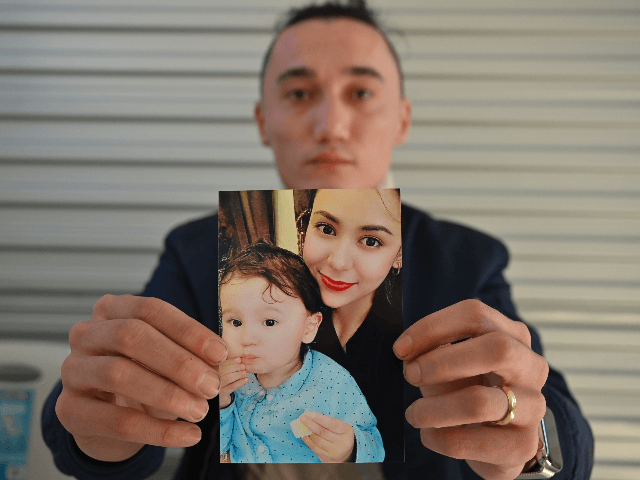China’s state-run media sputtered with outrage over Monday’s installment of the Australian television program Four Corners, which looked at the massive concentration camps China has established in Xinjiang province to hold a sizable portion of its Muslim population.
China slammed the report as “deplorable” and “cold-blooded,” by which it meant the Australian team overlooked all the wonderful things Beijing is doing for the Uighur people.
The Four Corners report, produced by Australia’s ABC public broadcasting service, charged Beijing with “effectively operating the world’s largest prison” and treating even those permitted to live in their homes as inmates with pervasive surveillance.
The investigators described the situation in Xinjiang as a matter of pressing importance for Australians because they might be doing business with Chinese companies that employ forced labor:
By piecing together witness accounts from Australian citizens caught up in the Chinese Government’s campaign, along with satellite imagery analysis and official documents uncovered online, the truth about what is occurring in Xinjiang is laid bare.
We have uncovered evidence of detainees being forced to work in factories with implications for Australian companies doing business in the region.
We also reveal concerning evidence about Australia’s links to China’s dystopian surveillance state and the tools used to racially profile its own citizens.
The 45-minute report can be seen in its entirety below:
China’s state-run Global Times on Tuesday accused the Australians of spreading propaganda and insisted the rest of the world can see Beijing’s awesome benevolence in the aggressive “development” of the restless Xinjiang province:
As the development of the Xinjiang Uyghur Autonomous Region becomes obvious to the rest of the world, the Australian Broadcasting Corporation broadcast a show about the region on Monday that showed nothing but the producers’ ignorance and cold-blooded attitude toward the happiness of people in the region and was totally deplorable, according to the Chinese Embassy and experts.
The Global Times quoted harsh criticism from the Chinese Embassy to Australia, which claimed the show was “full of lies, distortion, and bias” and was an “extremely unprofessional and unethical production, nothing but despicable and deplorable.”
The core Chinese strategy is to demand critics ignore their lying eyes and see how Xinjiang has flourished in the maternal embrace of the Communist Party, which clearly monitors every moment of the residents’ lives for their own good.
The Chinese government is putting a great deal of evidence into celebrating its achievements in Xinjiang and boasting of all the money it has poured into the impoverished province. A new and ostensibly “liberal” Communist administrator was put in charge of the province on Tuesday, a move outside analysts saw as an attempt to reassure international critics and signal the worst “vocational training” for the Uighur Muslims is behind them.
According to the Global Times, anyone who sees unwilling people concentrated into camps is just a tool of the great American conspiracy to delegitimize the ascending world power. The Global Times said:
Australia has been frequently attacking China on human rights issues in Xinjiang, and shares close relations with US right-wing parties, Yu Lei, a research fellow at Liaocheng University’s Research Center of Pacific Island Countries in East China’s Shandong Province, told the Global Times on Tuesday.
Many of those Western countries and their media are just hyping Xinjiang issues for their own purposes or to attract public attention, said the observers.
Chinese observers pointed out that Australia has seen rising antipathy against Muslims in recent years.
For example, Australian media have reported that some public figures have openly made Islamophobic comments.
Some Western countries want to hype human rights issues in Xinjiang, but they would fail as everyone knows their purpose is to contain China’s development and growing influence, Yu said.
The world would see the actual development of the region and the growing well-being of residents, he said.
To that end, China has been brandishing a joint letter from 37 countries to the United Nations Human Rights Council supporting Chinese policy in Xinjiang, ostensibly a rejoinder to an earlier letter from 22 nations critical of those policies.
The supportive letter, whose signatories include such human-rights titans as Russia, North Korea, Saudi Arabia, and Venezuela, excused China’s excesses in the name of combating “the grave challenge of terrorism and extremism” and agreed with Beijing’s characterization of the camps as “vocational education and training centers.”
The New York Times noted China refrained from signing the letter supporting itself, but it seems to have written much of the text, as it precisely matches statements made by Chinese diplomats and agencies.
The signatories have good reason to agree with China’s contention that outside observers should avoid challenging national sovereignty by criticizing human rights abuses, a stance that would negate the existence of the U.N. Human Rights Council if broadly accepted.
“It’s a sign of desperation that a country feels the need to praise itself. The fact that China can arm-twist delegations into supporting them is nothing new. The fact that other states stood up to it on Xinjiang is an important step forward,” said a deeply unimpressed John Fisher of Human Rights Watch.
The Australian government on Wednesday filed a formal request in Beijing to free the wife and two-year-old son of Sadam Abudusalamu, a Uighur living in Australia featured in the Four Corners report. Abudusalamu’s wife Nadila Wumaier and her child were detained by Chinese authorities after the program aired.
The Australian Foreign Ministry noted that the little boy holds Australian citizenship, although his mother does not, and asked Chinese authorities to allow them to join Abudusalamu in Australia.

COMMENTS
Please let us know if you're having issues with commenting.